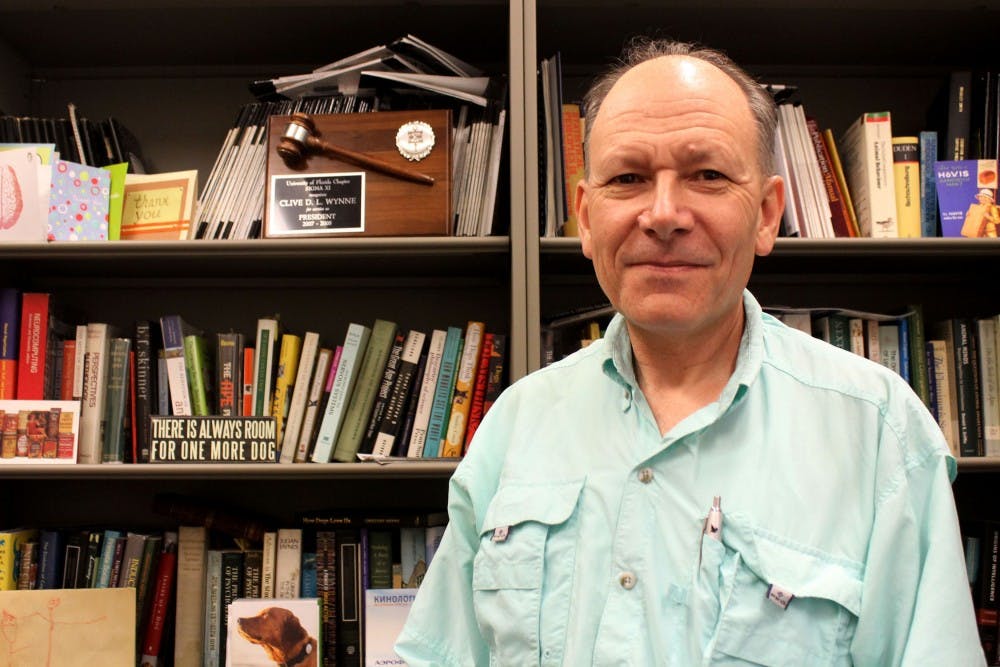In Clive Wynne’s case, the phrase “a dog is a man’s best friend” applies to not only his life, but also to his research.
Wynne is a professor of psychology at ASU who has conducted multiple research projects around the topic of canines. He said he came to ASU because his wife took a job here first and calls the decision “a happy accident."
He worked with rats and pigeons for 20 years, but said he gradually became interested in studying the relationship between people and dogs.
“I went through a kind of a mid-career crisis,” Wynne said. “I was kind of casting around what animal I could study where I would still have the intellectual satisfaction of understanding how animal behavior works, but that it would matter to the world.”
He says that what he does is in the gap between biology and psychology, since both sides study animal behavior. He said he likes to ask people if they have a dog and then to keep their hands up if they allow their dog to sleep in their bed.
“My intention is to make people focus in on just what an intimate spot in their lives they’ve let their dog into," Wynne said. “Most of us are picky about who we would let into our bed with us, but you let this animal in, this member of another species.”
He is currently teaching a new class on edX, an online class program, entitled “Dog Behavior and Cognition.” It’s a three-part series on canine origins, behavior and the problems and solutions of canine thinking.
“(Online), you can have guest lectures or interviews with the absolute world top experts in this material,” Wynne said. “I use them especially in areas where it’s not really my expertise or particularly I used it in an area where I honestly couldn't agree with this point of view.”
His current work is training dogs to detect ingredients that could be used to make an IED, a bomb. He said he was surprised when he initially couldn’t find reliable science on the topic of canine olfaction.
“What we’re looking at is (whether) we can engage the dog’s mind and brain in a way that the dog can make intelligent decisions for us,” Wynne said. “What we need the dog to tell us is this particular balance of combination of ingredients this could go bang, where as this combination of ingredients, this is harmless.”
He said all the dogs he uses are volunteers and that they plan to adopt out the shelter dogs that they’ve used in their research.
Lisa Gunter is in the third year of her psychology doctorate program. She recently conducted research, with the help of Wynne, about the effect that labeling a dog a pit bull can have on their chances of adoption.
She began to work with Wynne after a friend she had met while working in an animal shelter recommended that she apply to his lab. She said Wynne’s work is set apart from other labs that work with dogs because of his understanding of experimental design.
“I think that really benefits the students in the lab because the way in which we go about answering research questions really helps address other possible explanations for the phenomenon and not just necessarily what we’re hoping to find,” Gunter said.
Monique Udell, who was a doctoral student under Wynne when he was at the University of Florida, said she feels Wynne’s focus on writing really benefited her and that he shaped how she writes and speaks today.
Udell said that when she first started working with him, he had a primarily pigeon lab, but that dog behavior was something they were both interested in studying.
“It was something that we were both interested in starting, but was not our current area of focus and his willingness to do that and to take a risk mentoring somebody in this new area was really appealing,” she said.
Wynne said he hopes to work on a project soon about memory changes in dogs, but is currently looking for people to run it.
“In our normal lives with our dogs, we don’t ask much of their memories, so people don’t notice that their dog has a memory problem until the situation is actually very serious,” he said.
Related links:
ASU professor: Canine science may lead to advancements in cancer research
ASU explosives detection canine helps protect University, Valley
Reach the reporter at avcabral@asu.edu or follow @angeligagaa on Twitter.
Like The State Press on Facebook and follow @statepress on Twitter.




